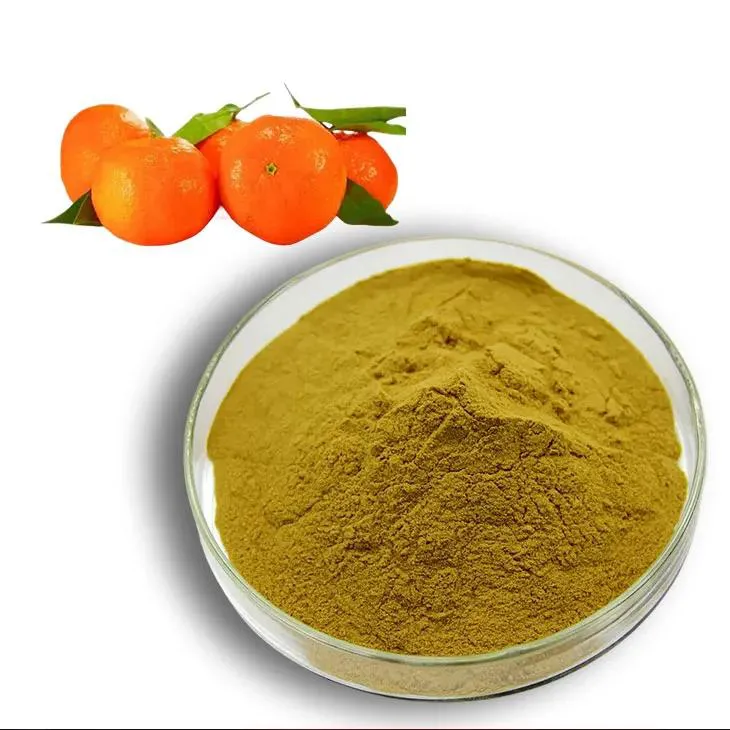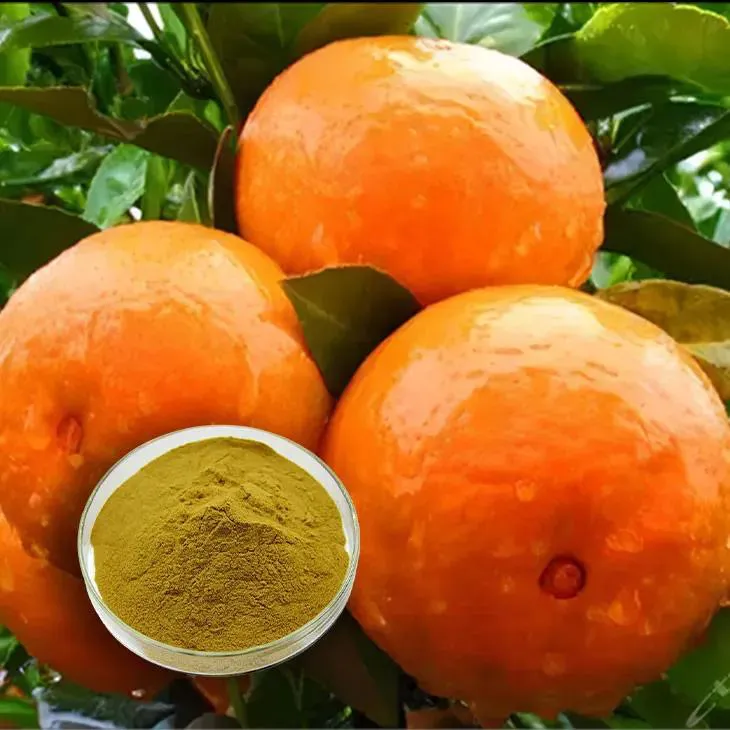- 0086-571-85302990
- sales@greenskybio.com
Have you heard of citrus bioflavonoids? Five unexpected health benefits.
2024-11-13

Introduction
Citrus fruits are not only delicious but also a rich source of various nutrients. Among these, Citrus bioflavonoids are often overlooked, yet they offer remarkable health benefits. Bioflavonoids are a group of plant - based compounds that are found in the peel, pulp, and membranes of citrus fruits such as oranges, lemons, and grapefruits. In this article, we will explore five unexpected health perks associated with Citrus bioflavonoids.

1. Boosting Immune System
Citrus bioflavonoids play a crucial role in strengthening the immune system. They work in several ways to enhance the body's defenses against infections and diseases.
Antioxidant Activity
One of the main mechanisms is through their antioxidant properties. These bioflavonoids are powerful antioxidants that can neutralize harmful free radicals in the body. Free radicals are unstable molecules that can damage cells and DNA, leading to various health problems and a weakened immune system. By scavenging free radicals, citrus bioflavonoids help protect the immune cells from oxidative stress, allowing them to function optimally.
Enhancing White Blood Cells
They also stimulate the production and activity of white blood cells. White blood cells are the body's front - line defense against pathogens. Citrus bioflavonoids can increase the number of white blood cells and improve their ability to recognize and destroy foreign invaders such as bacteria, viruses, and fungi. This enhanced immune response can help the body fight off infections more effectively and recover more quickly from illness.

2. Improving Skin Health
The impact of citrus bioflavonoids on skin health is quite remarkable.
Collagen Production
They contribute to collagen production. Collagen is a protein that provides structure and elasticity to the skin. As we age, collagen production decreases, leading to wrinkles, sagging skin, and a loss of firmness. Citrus bioflavonoids can stimulate the fibroblasts in the skin to produce more collagen, thus helping to maintain the skin's youthful appearance. This can result in smoother, firmer skin with fewer wrinkles.
Sun Protection
Another benefit for the skin is their potential for sun protection. While they are not a substitute for sunscreen, citrus bioflavonoids can offer some additional protection against the harmful effects of ultraviolet (UV) radiation. They can help reduce the damage caused by UV rays, such as sunburn, skin aging, and the risk of skin cancer. By incorporating citrus - rich foods or citrus bioflavonoid supplements into your diet, you may be able to enhance your skin's natural defenses against the sun.
Anti - Inflammatory Effects
Citrus bioflavonoids also have anti - inflammatory properties, which are beneficial for skin health. Inflammation in the skin can cause redness, itching, and various skin disorders. These bioflavonoids can reduce skin inflammation, soothe irritated skin, and promote a healthy skin environment.

3. Aiding in Digestion
When it comes to digestion, citrus bioflavonoids can be very helpful.
Stimulating Digestive Enzymes
They can stimulate the production of digestive enzymes. Digestive enzymes are essential for breaking down food into smaller molecules that can be easily absorbed by the body. Citrus bioflavonoids can enhance the activity of enzymes such as amylase, protease, and lipase, which are involved in the digestion of carbohydrates, proteins, and fats respectively. This improved enzyme activity can lead to better digestion and nutrient absorption.
Relieving Digestive Disorders
Moreover, they can help relieve certain digestive disorders. For example, they may be beneficial for those with indigestion, bloating, or constipation. The anti - inflammatory properties of citrus bioflavonoids can also reduce inflammation in the digestive tract, which can be helpful for people with conditions such as gastritis or inflammatory bowel disease.
4. Supporting Heart Health
Citrus bioflavonoids offer several benefits for heart health.
Lowering Blood Pressure
One of the ways they support heart health is by helping to lower blood pressure. High blood pressure is a major risk factor for heart disease. Citrus bioflavonoids can relax the blood vessels, reducing the resistance to blood flow and thereby lowering blood pressure. This effect can contribute to a healthier cardiovascular system.
Reducing Cholesterol Levels
They can also play a role in reducing cholesterol levels. Specifically, they may help lower LDL (low - density lipoprotein) cholesterol, which is often referred to as "bad" cholesterol. High levels of LDL cholesterol can lead to the build - up of plaque in the arteries, increasing the risk of heart attacks and strokes. By reducing LDL cholesterol levels, citrus bioflavonoids can help maintain healthy arteries and a reduced risk of heart disease.
Antioxidant Defense for the Heart
As antioxidants, citrus bioflavonoids also protect the heart from oxidative damage. The heart is constantly exposed to oxidative stress due to its high metabolic rate. By neutralizing free radicals, these bioflavonoids can prevent damage to the heart cells and blood vessels, further promoting heart health.
5. Promoting Eye Health
Finally, citrus bioflavonoids are beneficial for eye health.
Protecting Against Macular Degeneration
They can protect against macular degeneration, which is a leading cause of vision loss in older adults. Macular degeneration affects the central part of the retina, leading to a loss of sharp central vision. Citrus bioflavonoids can help prevent or slow down the progression of this condition by reducing oxidative stress in the eyes and protecting the retinal cells.
Reducing the Risk of Cataracts
Another eye - related benefit is their potential to reduce the risk of cataracts. Cataracts occur when the lens of the eye becomes cloudy, causing blurry vision. Citrus bioflavonoids can help maintain the clarity of the lens by protecting it from oxidative damage and inflammation.
Conclusion
In conclusion, citrus bioflavonoids are a group of compounds with many unexpected health benefits. From boosting the immune system to improving skin health, aiding in digestion, supporting heart health, and promoting eye health, these bioflavonoids are a valuable addition to a healthy diet. Incorporating more citrus fruits or citrus bioflavonoid supplements into your daily routine can be a simple yet effective way to reap these health rewards. However, it is always important to consult a healthcare professional before starting any new supplement regimen.
FAQ:
What are citrus bioflavonoids?
Citrus bioflavonoids are a group of plant - based compounds found in citrus fruits such as oranges, lemons, and grapefruits. They are known for their antioxidant properties and play various roles in maintaining health.
How do citrus bioflavonoids improve skin health?
Citrus bioflavonoids can improve skin health in several ways. Their antioxidant properties help combat free radicals that can damage skin cells. They may also contribute to collagen production, which is essential for maintaining skin elasticity and reducing the appearance of wrinkles.
Can citrus bioflavonoids really aid in digestion?
Yes, they can. Citrus bioflavonoids may help in digestion by promoting the secretion of digestive juices. They also have anti - inflammatory properties that can soothe the digestive tract and reduce inflammation, which may be beneficial for those with digestive disorders.
Are there any other health benefits of citrus bioflavonoids?
Besides improving skin health and aiding in digestion, citrus bioflavonoids may also support the immune system. They can help reduce the risk of certain chronic diseases, such as heart disease, by improving blood vessel function and reducing inflammation in the body.
How can one incorporate citrus bioflavonoids into their diet?
One can incorporate citrus bioflavonoids into their diet by consuming citrus fruits directly. Drinking fresh citrus juices, eating whole fruits, or using citrus zest in cooking are all good ways to get these beneficial compounds. Additionally, some dietary supplements also contain citrus bioflavonoids.
Related literature
- The Role of Citrus Bioflavonoids in Health and Disease"
- "Citrus Bioflavonoids: Potential Health Benefits and Applications"
- "Bioflavonoids from Citrus Fruits: A Review of Their Chemical Composition and Biological Activities"
- ▶ Hesperidin
- ▶ Citrus Bioflavonoids
- ▶ Plant Extract
- ▶ lycopene
- ▶ Diosmin
- ▶ Grape seed extract
- ▶ Sea buckthorn Juice Powder
- ▶ Fruit Juice Powder
- ▶ Hops Extract
- ▶ Artichoke Extract
- ▶ Mushroom extract
- ▶ Astaxanthin
- ▶ Green Tea Extract
- ▶ Curcumin
- ▶ Horse Chestnut Extract
- ▶ Other Product
- ▶ Boswellia Serrata Extract
- ▶ Resveratrol
- ▶ Marigold Extract
- ▶ Grape Leaf Extract
- ▶ New Product
- ▶ Aminolevulinic acid
- ▶ Cranberry Extract
- ▶ Red Yeast Rice
- ▶ Red Wine Extract
-
Boswellia Serrata Extract
2024-11-13
-
Tinospora cordifolia extract
2024-11-13
-
Polygonum Cuspidatum Extract
2024-11-13
-
Acai Berry Extract
2024-11-13
-
Motherwort Extract
2024-11-13
-
American Ginseng Root Extract
2024-11-13
-
White Willow Bark Extract
2024-11-13
-
Genistein
2024-11-13
-
Sea buckthorn oil
2024-11-13
-
Ivy Extract
2024-11-13





















